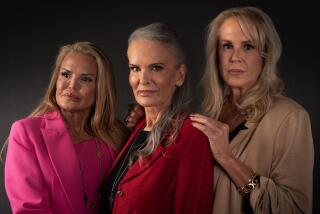‘90s FAMILY : Criticizing the Batterer Won’t Help the Victim
- Share via
If the O.J. Simpson case has taught us anything, it is that domestic violence is more than a private family matter. We know we should help when we see a friend or relative locked in an abusive relationship. But most of us don’t know how.
Women’s advocates say understanding and support are critical, but cite common mistakes made by family and friends when they try to help: criticizing the perpetrator, trying to make decisions for the victim and losing patience.
A 60-year-old Southland grandmother said she learned her daughter was being abused after her son-in-law hit her at a family gathering. “My husband and I were real hesitant to get involved at first. It was their situation,” she said. “But once she started telling us what was happening, my husband said we’ll do whatever we have to do.”
They confronted him at the party. “He was crying. He told me how much he loved his family. He promised he would go and get counseling. Of course he did none of that.”
They quickly learned that getting away is more difficult than the standard talk show advice: If they hit you once, leave. “People don’t understand you don’t walk away with several children,” she said. Her daughter was too beaten down emotionally to cope with her domineering husband. She had no financial resources of her own and because their home was jointly owned, she could not qualify for welfare.
Her husband continued hitting her with his fists, throwing her around, threatening her life. The children would call them for help during fights. Between incidents, he’d bring flowers, buy presents.
The neighbors knew, but sided with him, the grandmother said. “She’s not good with people. He’s fabulous. If you came over and met him, you’d think he’s wonderful. It is very scary. That is what killed us.”
At first, she made what experts say is a common mistake. She advised her daughter to placate him by not angering him and improving her homemaking.
According to Los Angeles psychiatrist Marjorie Braude, who chairs the Los Angeles City Domestic Violence Task Force, the two most important things friends and relatives can do is let the victim know they understand the problem, and provide them with hot-line and shelter numbers. “Very often the victim is not ready at that moment, but if she has that number in her purse, when that moment comes, she will use it.”
The idea is to empower the woman to make decisions for herself, not to replace the batterer with someone else who’s controlling her, said Rita Smith of the National Coalition Against Domestic Violence.
Similarly, it’s better to talk about how she deserves better treatment than to bad-mouth the batterer, Smith said. “The more you talk about what a bad guy he is, it puts her in a position of having to defend him because she chose him and she loves him still.”
Sometimes, an offer of refuge can be critical. In Los Angeles, where there are 43,000 emergency 911 calls each year involving domestic abuse, there are only 400 shelter beds. But it is also risky. He can track her down, vandalize the property or harass the occupants.
After the grandparents called 911 during one fight, the husband was furious and threatened to hurt them.
Finally, the grandmother said she paid for several months rent for a house for their daughter and her children, enabling them to move out. Another relative persuaded her women’s club to contribute $300 a month for food and clothing. The grandmother said the couple may soon be divorced.
The obstacles can make it easy for friends and family to get discouraged. Said Smith: “When people think like that, I want them to remember the thousands of battered women every day who manage to get over those obstacles. Take a rest, a timeout and start working on it again. There are women alive today who wouldn’t have been if friends and family weren’t there to help.”
More to Read
Sign up for Essential California
The most important California stories and recommendations in your inbox every morning.
You may occasionally receive promotional content from the Los Angeles Times.













